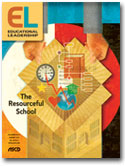The International Children's Digital Library is an amazing open-access resource with hundreds of digital books in dozens of different languages. Educators can use it to give children access to a rich library of culturally diverse books in a fun digital format. It also enables English language learners to access books in their native language as well as read books in English with protagonists from their heritage.
<ATTRIB>—J-Lynn Van Pelt, director, E.L. Cord Foundation Center for Learning and Literacy, University of Nevada, Reno</ATTRIB>
Teaching Channel contains videos showcasing many practical, specific ideas and tips for pedagogy organized by age level, subject area, and topic.
<ATTRIB>—Nick Romagnolo, professional development, Agile Mind</ATTRIB>
The Read Write Think website sponsored by the International Reading Association and the National Council of Teachers of English contains lesson plans and interactive tools that can be used in any content area that involves writing. There are maps you can adapt to help students organize their information for writing assignments. The unit plans have inspired some of the best units I have offered my students.
<ATTRIB>—Gwen Todd, secondary instructional resource teacher, Charles County Public Schools, Maryland</ATTRIB>
Edmodo is a web-based social networking tool that has allowed our district to provide a secure environment for teachers, students, and parents to work collaboratively. Teachers use Edmodo to post assignments, take class polls, and support students outside school hours. Students upload assignments, including podcasts and video recordings, directly to their teacher—the students love it! Parents are directly involved: Edmodo enables them to keep track of their children's upcoming assignments, events, and grades; and they can receive a text message or e-mail if the teacher sends out an announcement.
<ATTRIB>—Holly Blythe, instructional technology, Lincoln Consolidated School District, Arkansas</ATTRIB>
Blogs, definitely! Every day I learn about new technologies at www.freetech4teachers.com. ASCD Inservice provides me with information about best practices at www.ascd.org/blog. Education Week's Curriculum Matters has strategies for running professional development with limited resources at http://blogs.edweek.org/edweek/curriculum.
I keep current on the newest blog posts by subscribing through Google Reader and checking in at least once a day. When I find a resource I want to keep and share with others, I pass it along through my own blog (http://turnonyourbrain.wordpress.com).
I also tag posts to archive them by category: tech tools, professional development, teaching, and so on. With a quick search of my tags, I can pull up posts when I need them.
<ATTRIB>—Christina Hank, high school teacher, Northridge Local Schools, Dayton, Ohio</ATTRIB>
The Doing What Works website of the U.S. Department of Education helps educators identify and use effective teaching practices. It features interviews with experts, sample materials users can download, and videos and interviews from schools successfully implementing research-based practices.
<ATTRIB>—Gayle Jones Westerberg, retired elementary principal</ATTRIB>
Social Media Classroom and Collaboratory provides free, open-source, downloadable social media tools, including forums, blogs, wikis, social bookmarks, and lesson plans.
<ATTRIB>—Howard Rheingold, lecturer, Stanford University, California</ATTRIB>
Starfall Education, which produces a phonics-based reading and language arts curriculum, maintains a free public website () with games and activities. We use it in the classroom for whole-class or individual instruction, in the computer lab, and on our interactive whiteboards; and we recommend it often for parents to use at home.
<ATTRIB>—Julie Purinton, literacy specialist, West Canada Valley Elementary School, Newport, New York</ATTRIB>
Quizlet is a great website that allows you or your students to develop flash cards for your course with or without pictures and a text-to-speech feature. Quizlet will turn the flash cards into games or assessments with a touch of a tab.
<ATTRIB>—Margaret Searle, author/consultant</ATTRIB>
My favorite resource is Edutecher. As someone who plans professional development in my district, I constantly consult this site to integrate new technology into professional development for teachers. It contains a vast array of web 2.0 tools, app recommendations, and general technology information. It is sortable by content, grade level, and so on and is also available in the form of an iPhone/ iPad app. The website was created by a teacher and is entirely geared toward teachers.
<ATTRIB>—Stefanie Rosenberg Wager, curriculum coordinator, Des Moines Public Schools, Iowa</ATTRIB>
I read the newspaper every morning, and I'm always pulling articles from my personal subscription (Kansas City Star) into my classroom. I use a digital projector to annotate with kids as we read the article.
<ATTRIB>—Steve J. Moore, literacy coach, Independence School District, Missouri</ATTRIB>
I've been working on building my personal learning network since the ASCD Annual Conference. I consistently read the articles in various SmartBriefs in addition to the resources that come my way through Twitter and Facebook accounts.
I work with a young school faculty whose members are used to accessing these resources. Whenever any of us find anything interesting, we share it with the others. This has led to the consistent discussion of ideas and introduction of new classroom practices. As a group, we talk more about learning and teaching than ever before.
<ATTRIB>—David Stovenour, assistant principal, Dundalk High School, Baltimore County, Maryland</ATTRIB>
Free Technology for Teachers; The Edublogger; and The EduBlogs Teacher Challenge are tremendous free resources that help me learn about new technology tools that make me a better teacher—for example, Diigo, Facebook for Educators, Wikispaces, Edublogs, Wordle, and Classtools.net.
<ATTRIB>—Keith Ozsvath, band director, Rotolo Middle School, Batavia, Illinois</ATTRIB>
